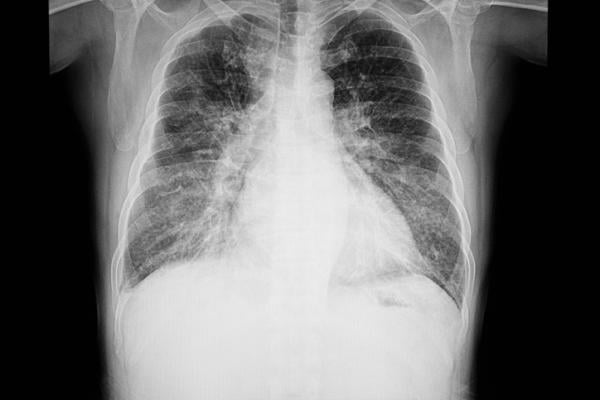
Chest X-ray of a congestive heart failure patient, showing fluid in the lower portions of the lungs and an enlarged heart. Getty Images
October 5, 2020 — The American College of Cardiology (ACC) says heart failure (HF) is a cardiovascular epidemic. In addition to being increasingly prevalent, HF patients often have poor outcomes after initial diagnosis and poor quality of life. The ACC has committed to transforming cardiovascular care for these patients through a collaboration with Novartis on TRANSFORM HFrEF, a national study aiming to improve care and outcomes for millions of heart failure patients.
“Heart Failure is the No. 1 diagnosis leading to potentially preventable hospitalizations, especially among the elderly,” said ACC Interim CEO Cathleen Gates. “Advancing quality, equity and value of cardiovascular care is a strategic priority for the College, and programs like this help us to optimize HF patient treatment and care and outcomes.”
The goal of TRANSFORM HFrEF will be to study the current landscape of guideline-directed medical therapy (GDMT) for patients with heart failure with reduced ejection fraction (HFrEF) and determine effective methods and models of increasing adherence to GDMT and quality of life in outpatient settings. This six-month randomized registry trial will aim to optimize GDMT and enhance patient engagement through redesigning the 20-minute outpatient appointment with interventions directed both to patient and caregiver. The trial will assess optimization of GDMT and improvements in patient-reported outcomes compared with usual care.
Although clinical practice guidelines clearly articulate optimal GDMT for care of patients with HFrEF, implementation of GDMT into the management of such patients has proven to be suboptimal, with most patients under-treated relative to goal therapy. Understanding reasons for pervasive gaps in GDMT is important to make strides to improve utilization of life-saving therapies for patients with HFrEF.
“The reasons for inadequate GDMT use may include clinician-based factors or patient-related factors, said James L. Januzzi, M.D., FACC, primary investigator for the trial and ACC Board of Trustees member. “Often times in the 20-minute office visit the clinician has numerous issues to consider and patients may not fully understand the impact of their treatment, resulting in less than optimal GDMT, which impacts physical health of the patient and ultimately quality of life.”
This research will leverage the PINNACLE Registry operated by Veradigm in association with the ACC, one of the largest outpatient cardiovascular clinical data registries in the world. It will provide tools that shift standard clinical interview and documentation requirements outside the doctor’s appointment and provide innovative tools to build the patient and physician relationship through trust and shared goal setting.
“It is our hope that the insights and results gained from this research will advance HF care and create a new standard for effective approaches to increasing adherence and improving outcomes for heart failure patients,” said David Platt, M.D., VP, Medical Unit Head, Cardiovascular, Renal & Metabolism, Novartis.
This initiative is the latest under the TRANSFORM umbrella. ACC introduced TRANSFORM as a new kind of quality research program aimed to improve health care by transforming the quality of care across the multi-faceted areas of cardiovascular disease. TRANSFORM programs leverage clinical registry data, office-based interventions, and partnerships to include the pharmaceutical and medical device industry, health plans, employers, clinicians and patients.
Related ACC PINNACLE Registry Content:
American College of Cardiology Research Network Uses Big Data to Connect Practices With Trials
Aspirin May be Inappropriately Prescribed to 10 Percent of Heart Patients
Study Reveals Low Statin Use in Diabetics Despite Cardioprotective Effects, Guidelines
American College of Cardiology Launches PINNACLE-AF Outpatient Registry


 July 31, 2024
July 31, 2024 








